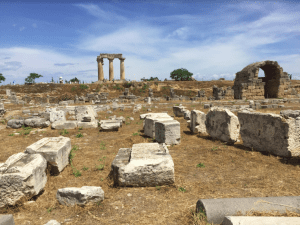The so-called Second Letter of Clement is not a letter, nor is it by Clement. It is, in fact, a sermon or “word of exhortation” composed by an anonymous presbyter (17.3), the oldest surviving complete Christian sermon outside the New Testament. Using a text from Isaiah (54:1; see 2.1 below), it presents a call to repentance, purity, and steadfastness, apparently in the context of a community gathered for worship (17.3).1 The “reader” (19.1) of the sermon, addressing a primarily Gentile congregation (1.6; 3.1), may also be reacting against gnostic influences (10.5; cf. the stress on the deity of Jesus [1.1] and the resurrection and judgment [9.1-5]).
Our series uses for its text Michael Holmes, The Apostolic Fathers. What about date, origin, etc?
W. H. C. Frend places it in Rome, perhaps around AD 100. E.J. Goodspeed has adopted the view that 2 Clement is really the lost letter of Bishop Soter of Rome mentioned by Bishop Dionysius of Corinth (ca. 170)… Lightfoot long ago noted that the reference in 7.1 to people “coming to enter the contests,” without any identification of the location, implies that the speaker was near the site of the contests, in this case Corinth, home of the well-known Isthmian games. He suggests that 2 Clement was a sermon, read to the Corinthian congregation sometime between AD 120 and 140, that was for some reason particularly notable and therefore preserved, along with other important documents such as the letter from Bishop Soter mentioned by Bishop Dionysius and the earlier letter from the Roman church written by Clement, whose name was eventually attached to the anonymous sermon. …
The date and occasion of 2 Clement, then, remain open questions.
What’s it about? It’s evidently a sermon. Upon finishing reading of Scripture it is an exhortation to faithfulness to the way of Christ in the face of threats like gnosticism, false teachers and rebellion against leaders.
Notice that opening “as we do of God.” This is very close to affirming the deity of Christ who is Judge, and belittling him is serious. Our redemption and conversion, the Preacher says, require faithfulness.
2Clem. 1:1 Brothers and sisters, we ought to think of Jesus Christ as we do of God, as judge of the living and the dead. And we ought not to belittle the one who is our salvation, 2 for when we belittle him, we also hope to receive but little. And those who listen as though these are small matters do wrong, and we also do wrong, when we fail to acknowledge from where and by whom and to what place we were called, and how much suffering Jesus Christ endured for our sake. 3 What repayment, then, shall we give to him, or what fruit worthy of what he has given to us? And how many holy acts do we owe him? 4 For he has given us the light; as a father he has called us children; he saved us when we were perishing. 5 What praise, then, shall we give him, or what repayment in return for what we received? 6 Our minds were blinded, and we worshiped stones and wood and gold and silver and brass, things made by humans; indeed, our whole life was nothing but death. So while we were thus wrapped in darkness and our vision was filled with this thick mist we recovered our sight, by his will laying aside the cloud wrapped around us. 7 For he had mercy upon us and in his compassion he saved us when we had no hope of salvation except that which comes from him, even though he had seen in us much deception and destruction. 8 For he called us when we did not exist, and out of nothing he willed us into being.
The Preacher turns to OT Scriptures: Isa 54:1. He reads it allegorically or at least moralistically as referring to their contemporary situation, where numbers of believers have increased.
2Clem. 2:1 “Rejoice, O barren woman, who bears no children; break forth and shout, you who have no labor pains; for the deserted woman has more children than she who has a husband.” Now when he said, “Rejoice, O barren woman, who bears no children,” he spoke of us, for our church was barren before children were given to it. 2 And when he said, “Shout, you who have no labor pains,” he means this: we should offer up our prayers to God sincerely, and not grow weary like women in labor. 3 And he said, “for the deserted woman has more children than she who has a husband,” because our people seemed to be abandoned by God, but now that we have believed, we have become more numerous than those who seemed to have God.
He turns to Jesus as Scripture. This is the earliest record of something in the NT being called Scripture. The theme is
4 And another scripture says, “I have not come to call the righteous, but sinners.” 5 He means this: it is necessary to save those who are perishing. 6 For it is a great and marvelous thing to support not those things that are standing but those that are falling. 7 So also Christ willed to save what was perishing, and he saved many when he came and called us who were already perishing.
Having quoted Jesus he now exhorts them once again to listen to him and obey him.
2Clem. 3:1 Seeing, then, that he has shown us such mercy—first of all, that we who are living do not sacrifice to dead gods, nor do we worship them, but through him have come to know the Father of truth—what else is knowledge with respect to him if it is not refusing to deny the one through whom we have come to know him? 2 Indeed, he himself says, “whoever acknowledges me before men, I will acknowledge before my Father.” 3 This, then, is our reward, if we acknowledge the one through whom we were saved.
How is Jesus acknowledged? (I add the ways in numbers.)
2Clem. 3:4 But how do we acknowledge him? (1) By doing what he says and (2) not disobeying his commandments, and (3) honoring him not only with our lips but with our whole heart and with our whole mind. 5 And in Isaiah he also says, “This people honors me with their lips, but their heart is far from me.”
2Clem. 4:1 Let us, therefore, (4) not merely call him Lord, for this will not save us. 2 For he says, “Not everyone who says to me, ‘Lord, Lord,’ will be saved, but only the one who does what is right.” 3 So then, brothers and sisters, let us acknowledge him in our actions (5) by loving one another, (6) by not committing adultery or (7) slandering one another or (8) being jealous, (9) but by being self-controlled, compassionate, and kind. (10) And we ought to have sympathy for one another, and not be avaricious. By these actions let us acknowledge him, and not by their opposites.
The judgment remains fixed in the Preacher’s attention as well as the implication of disobedience:
4 Further, we must fear not humans but God. 5 For this reason, if you do these things, the Lord has said, “If you are gathered with me close to my breast, yet you do not keep my commandments, I will throw you out and say to you: ‘Get away from me; I do not know where you are from, you evildoers.’?”









